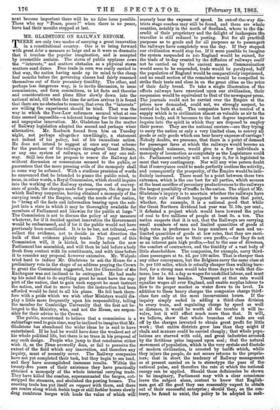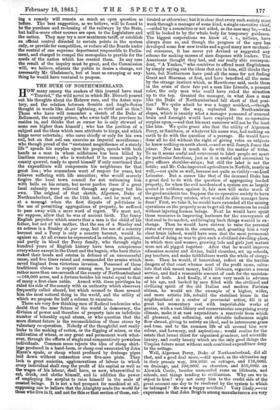MR.GLADSTONE ON RAILWAY REFORM. T HERE are only two modes of
carrying a great innovation in a constitutional country. One is to bring forward with great eclat a measure so large and as it were so dramatic that it touches the popular imagination, and is accepted by irresistible acclaim. The storm of public applause cows the " interests," and scatters obstacles as a physical storm scatters sand dunes. Free trade in corn was really carried in that way, the nation having made up its mind to the cheap loaf months before the governing classes had fairly reasoned themselves out of their pecuniary timidity. The other, and perhaps less dangerous way, is to invite discussion, to issue commissions, and form committees, to let facts and theories and considerations and plans filter slowly down into the national mind, till when the time for action arrives it is found that there are no obstacles to remove, that even the "interests" are willing the experiment should be tried. That was the way in which the Poor-Law reformers secured what at one time seemed impossible—a tolerant hearing for their immense and unpopular innovation. Mr. Gladstone has in the matter of Railway legislation adopted the second and perhaps wiser alternative. Mr. Roebuck forced from him on Tuesday night, not perhaps altogether unwillingly, a statement not indeed of his policy, but of his immediate action. He does not intend to suggest at once any vast scheme for the purchase of the railways throughout Great Britain, or any one system of railways, or even of any one rail- way. Still less does he propose to renew the Railway Act without discussion or concessions secured to the public, or guarantees that the more pressing evils of the monopoly shall in some way be softened. With a studious precision of words he announced that he intended to guano the public mind, to issue, in other words, a Royal Commission, which should inquire into the working of the Railway system, the cost of convey- ance of goods, the charges made for passengers, the degree in which Railway companies, having obtained a monopoly of the carrying trade of the Empire, satisfy the needs of the nation, to "bring all the facts and information bearing upon the sub- ject into a state in which it may be thoroughly available for members of Parliament and likewise for the public at large." The Commission is not to discuss the policy of any measure whatever, for if it decided against innovation the Government would be embarrassed, and if for it the public would not have previously been conciliated. It is to be bar, not tribunal,—to collect the evidence, not to decide in what direction the bulk of that evidence plainly tends. The report of this Commission will, it is hinted, be ready before the new Parliament has assembled, and will then be laid before a body fresh from contact with its constituents, and with time before it to consider any proposal however extensive. Mr. Walpole tried hard to induce Mr. Gladstone to ask the House for a preliminary vote in the shape of an address praying the Crown to grant the Commission suggested, but the Chancellor of the Exchequer was not inclined to be entrapped. He had made up his mind that to do anything great he must have the sup- port of the nation, that to gain such support he must instruct the nation, and that to move before the instruction had been afforded would be fatal to all his .plans. He fell back there- fore with a pride which we wish other Ministers would dis- play a little more frequently upon his responsibility, telling the member for Cambridge University that the first act be- longed to the Ministry, who, and not the House, are respon- sible for their advice to the Crown.
The public, accustomed to believe that a commission is a subterfuge used to gain time, may be inclined to imagine that Mr. Gladstone has abandoned the wider ideas he is said to have entertained. If he had he would have done the weakest act of his whole political life, but there is no trace in his proposal of any such design. People who jump to that conclusion either wish it, as the Times avowedly does, or fail to perceive the extent of the field which any innovation, and therefore any inquiry, must of necessity cover. The Railway companies have not yet completed their task, but they begin to see land, and they have accomplished immense results. Within the twenty-five years of their existence they have practically obtained a monopoly of the whole internal carrying trade. They have killed the coaches, superannuated the barges, out- stripped the steamers, and abolished the posting houses. The coasting trade has put itself en rapport with them, and there are routes along which feeble tugs or still feebler horses slowly drag cumbrous barges with loads the value of which will scarcely bear the expense of speed. In out-of-the-way dis- tricts stage coaches may still be found, and there are whole counties, notably in the north of Scotland, where to the dis- credit of their proprietary and the delight of innkeepers the traveller is still reduced to posting. But for all practical purposes as to goods and for all purposes as to passengers the railways have completely won the day. If they stopped our civilization would stop too. If it were possible to imagine the system suspended in toto England would be ruined, for the trade of to-day created by the diffusion of railways could not be carried on by the ancient means. Communication would seem to be suspended, trade would be paralyzed, half the population of England would be comparatively imprisoned, and no small section of the remainder would be compelled to strike their tents and close in on the great cities as the price of their daily bread. To take a single illustration of the effects railways have exercised upon our civilization, their- suspension would be equivalent to that of the newspaper press.. The journals could not be carried over the Empire at the prices now demanded, could not, we strongly suspect, be carried in bulk at all. The companies have the control of a supply which is to civilization almost as valuable as air to the human body, and it becomes to the last degree important to inquire into the spirit in which they are disposed to employ their power. They are the national carriers—are they trying to carry the nation or only a very limited class, to convey all goods or only goods which can bear heavy expense of carriage Nobody doubts, we presume, that there is a point of demand for passenger fares at which the railways would become an unmitigated nuisance, would give to a few individuals a monopoly of locomotion as completely as the Legislature could do. Parliament certainly will not deny it, for it legislated to meet that very contingency. Nor will any wise person doubt that if conveyance could be made perfectly costless the activity, and consequently the prosperity, of the Empire would be inde- finitely increased. There must be a point between those two extremes, which is the one best for all parties, which secures at the least sacrifice of pecuniary productiveness to the railways- the largest possibility of traffic to the nation. The object of Mr. Gladstone's inquiry is to ascertain whether the railways have by their rule of thumb happened to ascertain that point, whether, for example, it is a national good that while the Great Northern dividend last year was 7/. 10s. per cent., it defeated a project which would have lowered the price of coal to five millions of people at least 3s. a ton. The nation suspects that it is not, that the Railways are carrying small numbers of men and limited quantities of goods at high rates in preference to large numbers of men and un- limited quantities of goods at low rates, that they are sacri- ficing the public not to their own profits,—for they do not as an interest gain high profits,—but to the ease of directors, the comfort of contractors, and the timidity of a vast body of little shareholders. The companies, for example, carry third- class passengers at 8s. 4d. per 100 miles. That is cheaper than any other conveyance, but the Belgians carry the same class at 3s. per 100 miles, which is actually cheaper than walking bare- foot, for a strong man would take three days to walk that dis- tance, lose ls. 6d. a day as wages for unskilled labour, and must pay for his keep besides. Transport at that rate would equalize wages all over England, and enable surplus labour to flow to its proper market as water flows to its level. In addition to these heavy charges the companies charge third- class fare only at the most inconvenient hours. If the inquiry simply ended in adding a third-class division to every train, and regulating charge by speed as well as distance, it would be worth all the trouble it will in- volve, but it will effect much more than that. It will,. we believe, show that whole branches of trade are cut off by the charges invented to obtain great profit for little work ; that entire districts grow less than they might if chalk and manure could be carried cheaply; that whole popu- lations are starved with cold, and great industries arrested by the fictitious price imposed upon coal; that the natural movement of population, which is the very systole and diastole of modern civilization, is arrested by tariffs which, while they injure the people, do not secure returns to the proprie- tors; that in short the tendency of Railway management as at present carried on is to stereotype the pace of the national pulse, and therefore the rate at which the national energy can be applied. Should these deficiencies be shown to be imaginary, Parliament may with a clear conscience leave the subject alone, content to know that English- men get all the good they can reasonably 'expect to obtain out of their successful enterprise ; should they, on the con- trary, be found to exist, the policy to be adopted in seek-
ing a remedy will remain as much an open question as before. The best suggestion, as we believe, will be found to be the purchase and re-leasing of the railways by the State, but half-a-score other courses are open to the Legislature and the nation. They may try a new maximum tariff, or establish an official control directed to certain points in the system only, or provide for competition, or reduce all the Boards under the control of one supreme department responsible to Parlia- ment, and charged to compel the monopolies to provide for the needs of the nation which has created them. In any case the result of the inquiry must be great, and the Commission will, we believe, educate the public to desire a change, not necessarily Mr. Gladstone's, but at least as sweeping as any- thing he would have ventured to propose.































 Previous page
Previous page